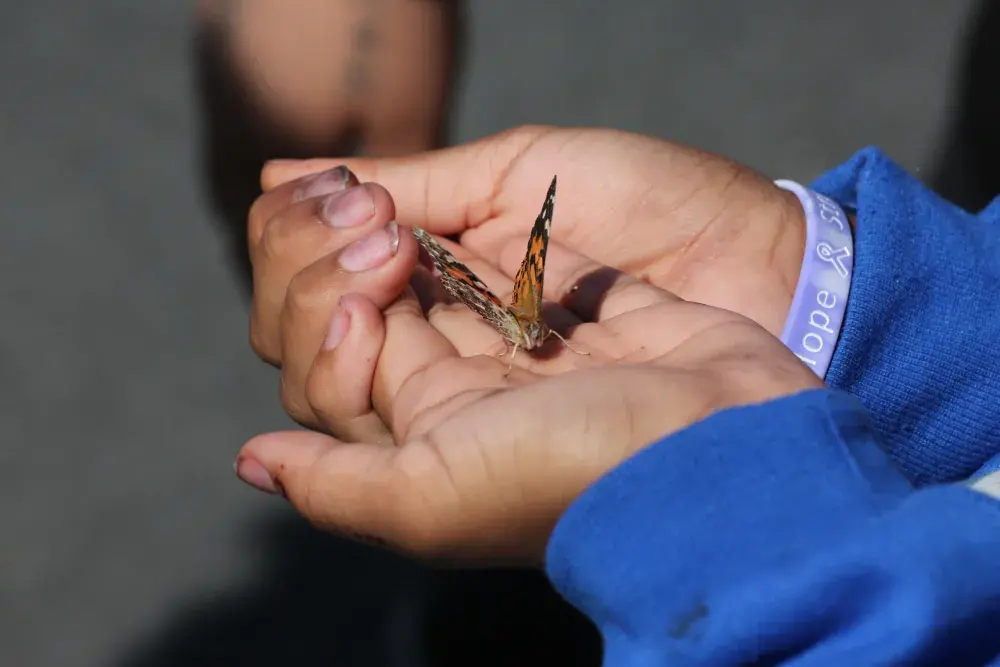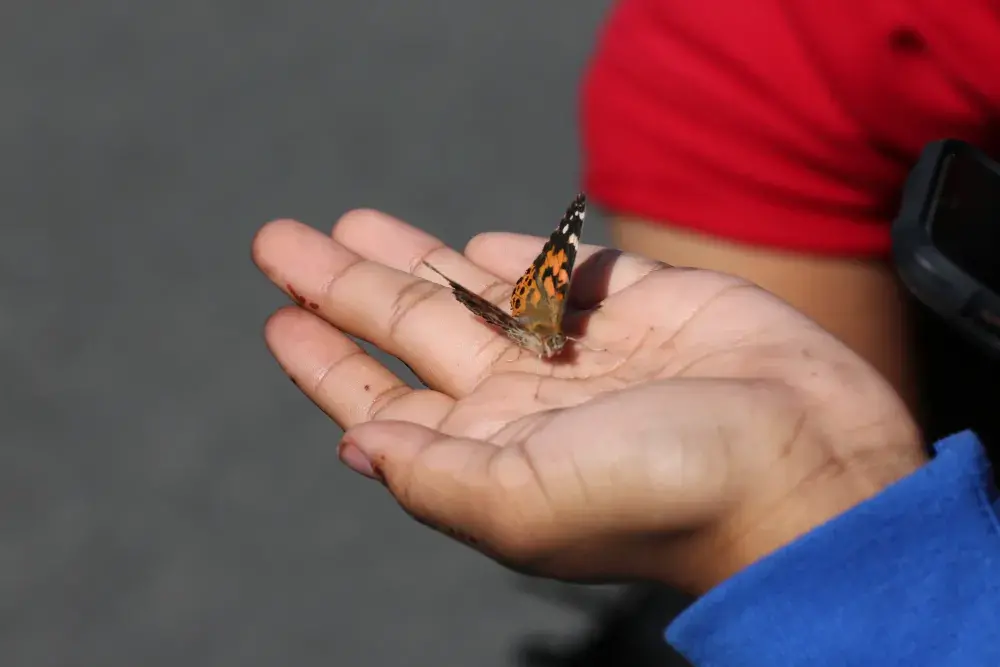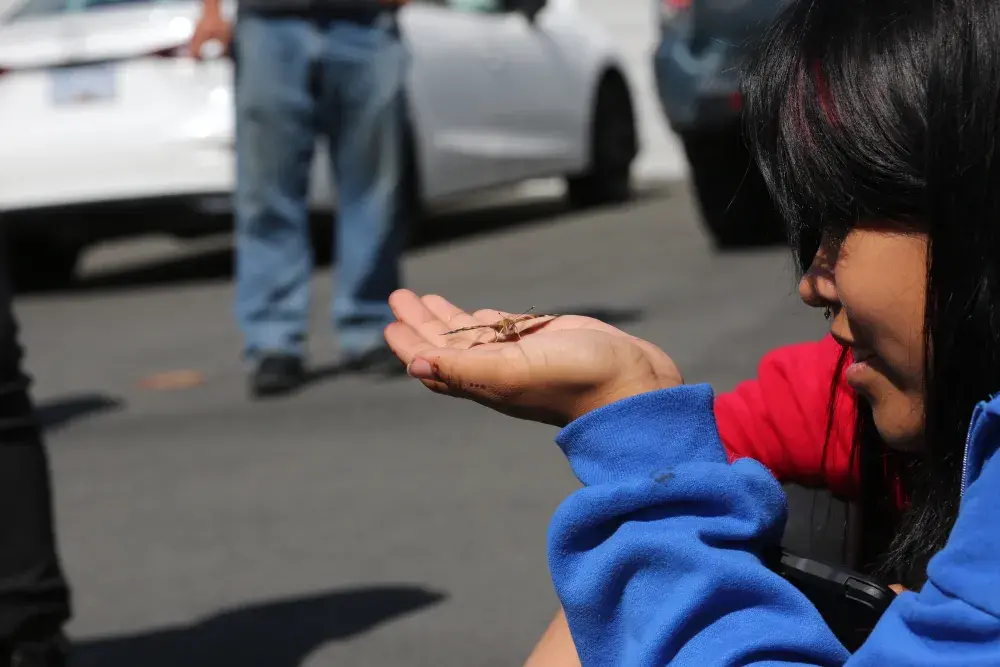On the last day of August a cloudy sky opened to a rich blue, awaiting the release of butterflies from those whose thoughts were with loved ones lost to drug overdose.
The release of 10 butterflies occurred in the parking lot behind Usma Nuu-chah-nulth Family and Child Services’ main office in Port Alberni, marking International Overdose Awareness Day.
Jaimey Richmond, a youth harm reduction outreach worker with Usma, hoped that the event would allow people to think beyond the shame that is often associated with a victim to drug overdose.
“We chose the butterflies because they symbolize transformation,” she said. “Whatever message you give them is flown up to the Creator. It’s a very personal moment for people.”
Aug. 31 came two days after the latest data was released from the BC Coroners Service, showing that at least 198 people died due to toxic drug use in July, a rate of 6.4 per day across British Columbia. Seven years into the provincial state of emergency, Chief Coroner Lisa Lapoint stressed the urgency to treat the opioid crisis by spreading a safer supply of prescribed medical alternatives, diverting users from an increasingly unpredictable combination of narcotics available on the street. Over the first seven months of 2023 at least 1,455 people have died due to toxic drug use, B.C.’s highest fatal tally yet from January to the end of July.
“I am saddened to once again report that British Columbia’s toxic drug crisis shows no signs of abating,” said Lapointe. “The unregulated illicit market is highly unpredictable and continues to put thousands of lives at risk each month. Despite recommendations for the urgent expansion of a safer supply, few have access to a stable, lower-risk alternative.”
This unregulated market includes additives like benzodiazepines and fentanyl, an opioid that has been found in 82 per cent of fatal cases analyzed last year by the BC Coroners Service. Seven years ago the presence of fentanyl coincided with escalating overdose rates, prompting the provincial health emergency to be declared in 2016. Fatalities climbed to 1,562 in 2018, however the next year front line workers and public health officials saw progress in their efforts as the death toll dropped to 987.
But this all changed with the onset of the COVID-19 pandemic and its accompanying restrictions and guidance for people to stay home. In 2020 illicit drug-related fatalities grew to 1,775, followed by 2,306 in 2021 – a grim rate that has shown no signs of ceasing since.
Seventy-seven per cent of illicit drug fatalities have been male, but Indigenous women have been affected at a greater rate, dying at 11.2 times that of the general female population in B.C., according to the First Nation Health Authority’s statistics from 2022.
“It’s affected every single Nuu-chah-nulth person,” said Richmond of the opioid crisis. “It’s an everyday occurrence, whether it’s a friend or a family member.”
At the Aug. 31 gathering Tseshaht member Trevor Little reflected on how Port Alberni’s Uptown district has changed, where lower 4th Avenue is now considered by many to be the poorest in the city.
“It didn’t look like that before,” he said.
“Every young person wants to go out and have a good time. Every young person wants to loosen up and get to know other people,” added Little. “I would hate to lose young precious lives, because it feels like we can’t get them back if they end up down there.”
Little shared that his sister is currently in the Uptown area struggling with addiction. She raised children at the same time as Little did, but things changed after she got into drugs just before turning 40.
“My sister was a beautiful parent like I was trying to be,” reflected Little. “I miss her, and I feel like I can’t help her.”
As policy makers search for solutions, it has become clear that “using alone can be a death sentence,” said Jennifer Whiteside, B.C.’s minster of Mental Health and Addictions.
“Deaths from the toxic drug crisis can be prevented. However, stigma and fear of judgement too often force individuals into the shadows, using drugs alone and avoiding life-saving resources,” she stated.
In an effort to divert people from the criminal justice system and towards the life-saving supports they need, at the end of January smaller amounts of illicit drugs were decriminalized in B.C. For at least three years the province has been granted an exemption under Canada’s Controlled Drugs and Substances Act, removing criminal charges or seizure for the personal possession of up to 2.5 grams of opioids, cocaine, methamphetamine and MDMA.
It is yet to be determined how this will help a community like Port Alberni, a small city that Courtenay-Alberni MP Gord Johns has called “ground zero” of the overdose crisis, where the fatality rate was double than what occurred across the Island Heath region last year.
In early July Carolyn Bennett, who was then federal minister of Mental Health and Addictions, visited the Walyaqil Tiny Shelter Village, a collection of 20 living units set to open on Fourth Avenue this summer. Operated by the Port Alberni Friendship Center, the tiny homes offer around-the-clock support to residents, including harm reduction measures for illicit drug use.
“I think that we’re trying to teach people that this is trauma-informed approach,” said Bennett of the government’s response to the toxic drug crisis. “Certain people have to numb themselves out of the pain, whether it was child abuse, or they fell off a roof and then got cut off their meds and went to the street for their drugs. People require our love and our care, and not jail.”
For Nuu-chah-nulth-aht, the necessary care also entails being exposed to the healing cultural practices of their ancestors, said Richmond.
“We know going back to traditional ways is healing. That’s why at our events or anything we’re doing we’re trying to incorporate culture into that, because so much of the addiction stems from trauma, it stems from what happened in residential schools and intergenerational trauma.”
After Little spoke about his sister on Aug. 31, he shared a song.
“This prayer song I’m going to share originates in the August family and was brought to Tseshaht,” he said. “It’s a beautiful story to me about a lady who was lost and needed to be found.”
“Today is about acknowledging and paying our respects to every friend and family member who’s lost somebody,” said Richmond. “If anyone is ever needing that support, we’re just a phone call away.”





